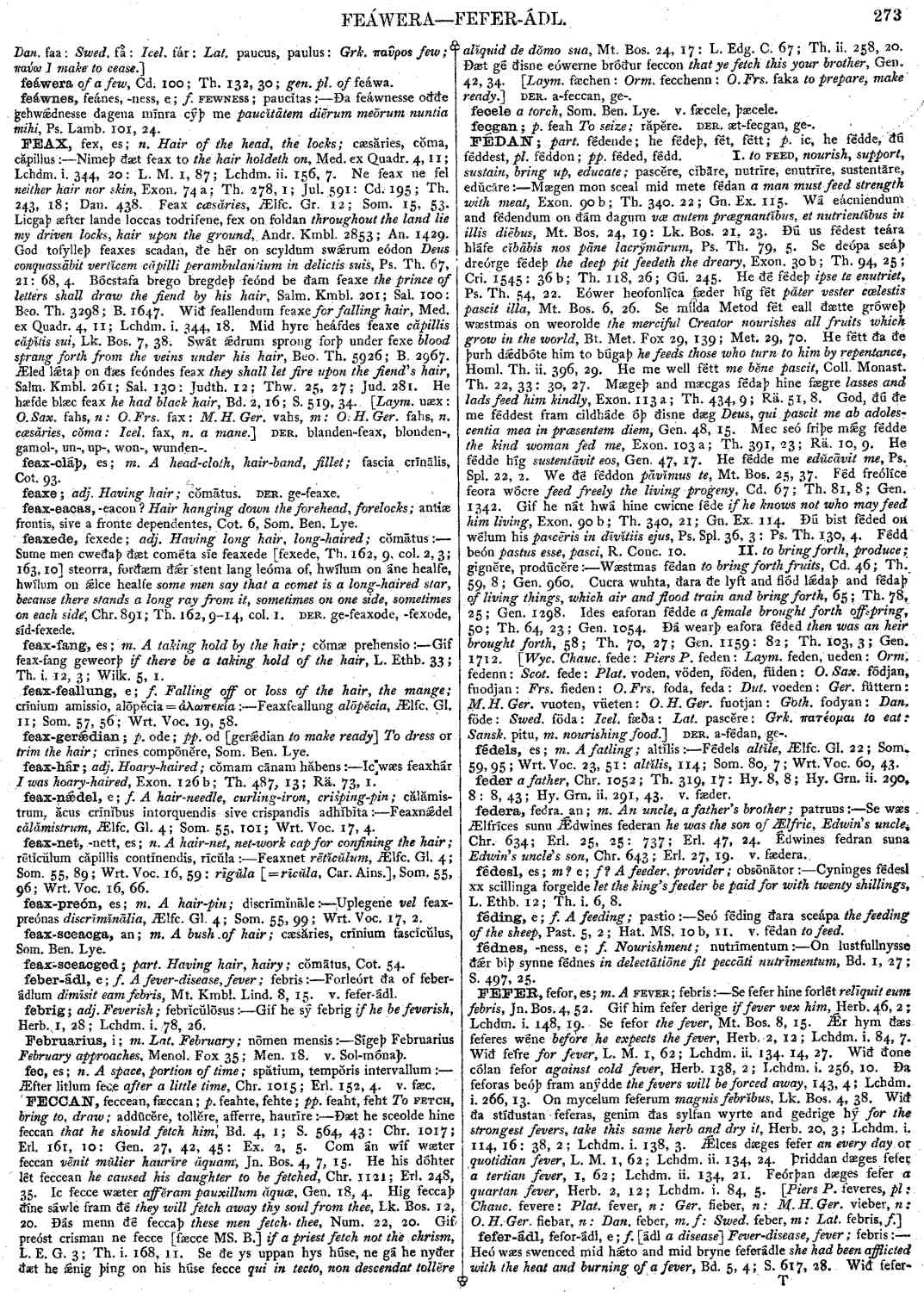FÉDAN
- verb [ weak ]
-
Mægen mon sceal mid mete fédan
a man must feed strength with meat,
- Exon. 90 b ;
- Th. 340, 22 ;
- Gn. Ex. 115.
-
Wá eácniendum and fédendum on ðám dagum
væ autem prægnantĭbus, et nutrientĭbus in illis diābus,
- Mt. Bos. 24, 19: Lk. Bos. 21, 23.
-
Ðú us fédest teára hláfe cĭbābis nos pāne lacry̆mārum, Ps. Th. 79, 5, Se deópa seáþ dreórge fédeþ
the deep pit feedeth the dreary,
- Exon. 30 b ;
- Th. 94, 25 ;
- Cri. 1545: 36 b ;
- Th. 118, 26 ;
- Gú. 245.
-
He ðé fédeþ
ipse te enutriet,
- Ps. Th. 54, 22.
-
Eówer heofonlíca fæder híg fét
păter vester cœlestis pascit illa,
- Mt. Bos. 6, 26.
-
Se milda Metod fét eall ðætte gróweþ wæstmas on weorolde
the merciful Creator nourishes all fruits which grow in the world,
- Bt. Met. Fox 29, 139 ;
- Met. 29, 70.
-
He fétt ða ðe þurh dǽdbóte him to búgaþ
he feeds those who turn to him by repentance,
- Homl. Th. ii. 396, 29.
-
He me well fétt
me bĕne pascit,
- Coll. Monast. Th. 22, 33: 30, 27.
-
Mægeþ and mæcgas fédaþ hine fægre
lasses and lads feed him kindly,
- Exon. 113 a ;
- Th. 434, 9 ;
- Rä. 51, 8.
-
God, ðú ðe me féddest fram cildháde óþ ðisne dæg
Deus, qui pascit me ab adolescentia mea in præsentem diem,
- Gen. 48, 15.
-
Mec seó friþe mǽg fédde
the kind woman fed me,
- Exon. 103 a ;
- Th. 391, 23 ;
- Rä, 10, 9.
-
He fédde híg
sustentāvit eos,
- Gen. 47, 17.
-
He fédde me
edŭcāvit me,
- Ps. Spl. 22, 2.
-
We ðé féddon
pāvĭmus te,
- Mt. Bos. 25, 37.
-
Féd freólíce feora wócre
feed freely the living progeny,
- Cd. 67 ;
- Th. 81, 8 ;
- Gen. 1342.
-
Gif he nát hwá hine cwicne féde
if he knows not who may feed him living,
- Exon. 90 b ;
- Th. 340, 21 ;
- Gn. Ex. 114.
-
Ðú bist féded on wélum his
pascēris in dīvĭtiis ejus,
- Ps. Spl. 36, 3: Ps. Th. 130, 4.
-
Fédd beón
pastus esse, pasci,
- R. Conc. 10.
-
Wæstmas fédan
to bring forth fruits,
- Cd. 46 ;
- Th. 59, 8 ;
- Gen. 960.
-
Cucra wuhta, ðara ðe lyft and flód lǽdaþ and fédaþ
of living things, which air and flood train and bring forth,
- 65 ;
- Th. 78, 25 ;
- Gen. 1298.
-
Ides eaforan fédde
a female brought forth offspring
,- 50 ;
- Th. 64, 23 ;
- Gen. 1054 ,
Ðá wearþ eafora féded
then was an heir brought forth,
- 58 ;
- Th. 70, 27 ;
- Gen. 1159: 82 ;
- Th. 103, 3 ;
- Gen. 1712.
Bosworth, Joseph. “FÉDAN.” In An Anglo-Saxon Dictionary Online, edited by Thomas Northcote Toller, Christ Sean, and Ondřej Tichy. Prague: Faculty of Arts, Charles University, 2014. https://bosworthtoller.com/10215.
Checked: 1